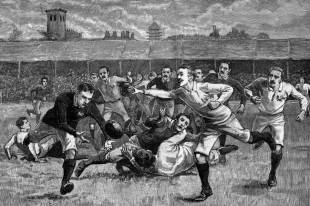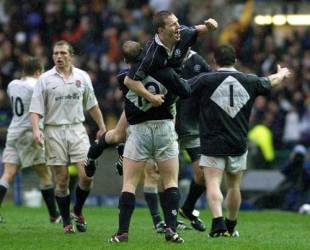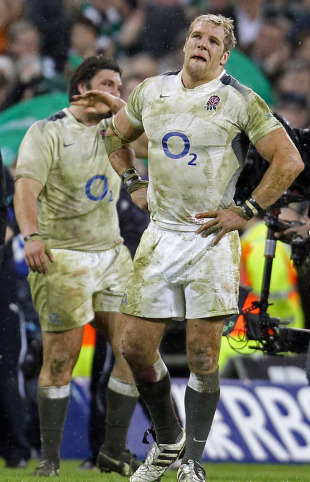|
Scrum Sevens
Falling at the final hurdle
Tom Hamilton
March 16, 2013

England and Scotland contest for the ball during their match in 1891
© Getty Images
Enlarge
Wales hammered England 30-3 on Saturday to conclusively end Stuart Lancaster's team's dreams of winning their first Grand Slam since 2003. Scrum Sevens, perhaps somewhat morbidly from an English point of view, looks back at the occasions where England's bubble has burst with the clean sweep tantalisingly close.
1891England opened the 1891 Home Nations tournament with a 7-3 triumph over Wales in front of 9,000 supporters in Newport and backed that up with a 9-0 win in Dublin against Ireland. They went into the final match of the championship full of confidence but came up against a resolute Scottish outfit. The crowd packed into Richmond's Athletic Ground with The Times putting the attendance at 18,000. Scotland took the match 9-3 with the newspaper reporting: "The great success achieved by the Scotch fifteen at Richmond on Saturday afternoon was the result of much excellent forward play and well-finished passing behind the scrummage." England's half-backs struggled meaning "such good players as Alderson, Christopherson and Lockwood were compulsorily idle for a great part of the game". England were denied the clean sweep and they experienced this again four years later in near identical fashion. They defeated Wales in Swansea and then Ireland in Dublin but fell to Scotland in Richmond 6-3.
1954England opened their 1954 Five Nations campaign with three wins from three but between the men in white and the Grand Slam lay the French, who were smarting from losing 19-13 to Wales. England travelled to Colombes and came up against a French whirlwind playing at a pace that, at the time, was not associated with Les Bleus. Peter Wilson, writing for The Daily Mirror, said it was like "seeing one of those films which have been speeded up to super-spring pace." Andre Boniface and Maurice Prat scored for the home side while Tug Wilson went over for England with France eventually taking the game 11-3. The win meant that the Five Nations was to be shared three ways between England, France and Wales - it was the first time Les Bleus had their name on the trophy having made their championship bow in 1947. It was a seminal moment in French rugby and the English journalists at the time admitted it was hard to not feel some admiration for their cross-Channel rivals. Wilson wrote: "Even if your great-great-great-great-grandfather fell at Waterloo - and, considering how slippery some of the platforms are, who could blame him? - you couldn't begrudge the French their victory."
1990England had last tasted Five Nations success in 1980 but the rest of the decade was a grim time for English rugby. In contrast, France had scooped six titles during that ten-year spell but in 1990 they faced a rejuvenated England side which featured the likes of Will Carling, Jeremy Guscott and the Underwoods - albeit they were playing behind a pack in the twilight years of their careers. They breezed through their first three matches of the tournament and with Scotland also going into the final round with a perfect record, it was all tantalisingly poised for a Grand Slam shootout at Murrayfield. In the run up to the match Scotland coach Jim Telfer adopted a hard line approach to training, as Tom English recalled in his book The Grudge. "'We're doing fifty scrums,' he stated, 'and if they're not right, we're doing another fifty and another fifty. We don't leave until everything is perfect because, boys, this Saturday you have a chance to write your names in history and I won't let you f*** it up by being soft.'" And come the match itself, England's ageing pack came under the microscope while skipper Carling's decision to turn down four kickable penalties was criticised post-match. For Scotland, captain David Sole's slow and methodical walk onto the Murrayfield turf upped the ante and after one of the most passionate renditions of 'Flower of Scotland' it looked destined to be a match that the home side were never going to lose. Scotland took the game 13-7 and in the process achieved their first Slam since 1984. The Daily Express at the time described it as a match that was "one in the eye for cocky England and one in the eye for the Government down South" - a reference to the Margaret Thatcher's controversial Poll Tax.
1999The last championship before the Millennium seemed destined to end in a Grand Slam for England. They were playing some stunning rugby with 19-year-old fly-half Jonny Wilkinson at the fulcrum of their developing side. Up to that point Clive Woodward's men had dispatched Scotland and France at Twickenham and Ireland at Lansdowne Road. Wales, playing at Wembley while the Millennium Stadium was being finished off, only had one win from three so the wind was firmly behind the men in white.
England outscored Wales three tries to two on the day with Steve Hanley, Dan Luger and Richard Hill all burrowing over, but the difference between the two teams was Neil Jenkins - with then Wales coach Graham Henry saying afterwards that, "If the posts had been two metres apart instead of ten, Neil Jenkins would still have kicked all his points." But it was a match that is remembered best for Scott Gibbs' try two minutes into injury time. Wales trailed 31-25 and the England contingent in the stand were already celebrating the Slam. Gibbs had other ideas and crashed over in the corner of the pitch much to the delirium of the Welsh fans. Jenkins nailed the touchline conversion and after a tense couple of minutes, including a missed Mike Catt drop-goal, Shane Howarth booted the ball into the crowd and Wales had their victory - a win that meant it would be Scotland who lifted the last Five Nations trophy.

Andy Nicol celebrates Scotland's win over England
© Getty Images
Enlarge
2000Lightning couldn't strike twice, could it? Well it did - England fell at the final hurdle for the second time in two years. This time it was to Scotland but unlike the previous year, Woodward's men still lifted the Six Nations trophy in the first year of the expanded format. By the time they travelled to Murrayfield, England had already run in 19 tries, with Ben Cohen and Austin Healey contributing five each. But Scotland rallied and beat England for the first time in ten years. Duncan Hodge was the toast of Edinburgh as he contributed all of Scotland's 19 points in their 19-13 win but it was a collective effort with everyone from 15 to 1 shining. Amid the inclement conditions, Scotland coach Ian McGeechan reflected on the result and, perhaps with more than just a hint of tongue-in-cheek, said: "The perfect result, eh? England get the championship and we get the Calcutta Cup. We both go away happy."
2001It was a bizarre championship in 2001 with an enforced six month hiatus, due to foot-and-mouth disease, halting England's momentum between their fourth and fifth matches. Their fourth game of the tournament against France saw them come away with a 48-19 triumph and England seemed destined to complete the Grand Slam.

James Haskell takes in England's loss to Ireland
© Getty Images
Enlarge
But due to the agricultural disease wrecking havoc in and around the United Kingdom, England's championship bid was delayed until October. Ireland's charge for the clean sweep had already come unstuck in round four with Scotland defeating them 32-10 in September but they could still put the spanner in England's works. In the end they managed to secure a 20-14 triumph, with Keith Wood scoring for Ireland and Austin Healey going over for England. When the full-time whistle sounded England suffered the embarrassment of having to watch Ireland do their celebratory jig around Lansdowne Road. It was England's third Grand Slam failure in as many years.
2011It all looked to be going so well for Martin Johnson's England. They had gone to Wales and won and then put 59 points on Italy in round two. They had backed it up with a hard fought 17-9 triumph over France and they teed up a possible Grand Slam with a nervy 22-16 win over Scotland. In their way, like 2001, lay the Irish. Ireland had collected two wins from their four matches and went into the game as underdogs. But in front of the Dublin faithful they produced the performance of the championship with Brian O'Driscoll at the heart of everything they did well. He grabbed their second try with Tommy Bowe crashing over for their first while Jonathan Sexton added the rest of their 24 points with the boot. Johnson and the rest of his England backroom staff watched on powerless as the men wearing emerald green cantered to a 24-8 triumph, leaving Nick Easter to pick up the Six Nations trophy in a Dublin hotel later that evening rather than in front of their supporters as they had to wait on the outcome of Wales' game in Paris later in the day. In the end Warren Gatland's side fell to the French and England's name was etched onto the famous trophy, but it was an underwhelming end to the championship for Johnson's side. © ESPN Sports Media Ltd. Tom Hamilton is the Assistant Editor of ESPNscrum.
| |||||||||||||||
Live Sports
Communication error please reload the page.
-
Football
-
Cricket
-
Rugby
-
- Days
- Hrs
- Mins
- Secs
F1 - Abu Dhabi GP
Abu Dhabi Grand Prix December 11-131. Max Verstappen ()
2. Valtteri Bottas (Mercedes)
3. Lewis Hamilton (Mercedes)
4. Alexander Albon ()
5. Lando Norris ()
6. Carlos Sainz Jr ()
-
ESPNOtherLive >>
Golf - Houston Open
Snooker - China Open
Tennis - Miami Open

